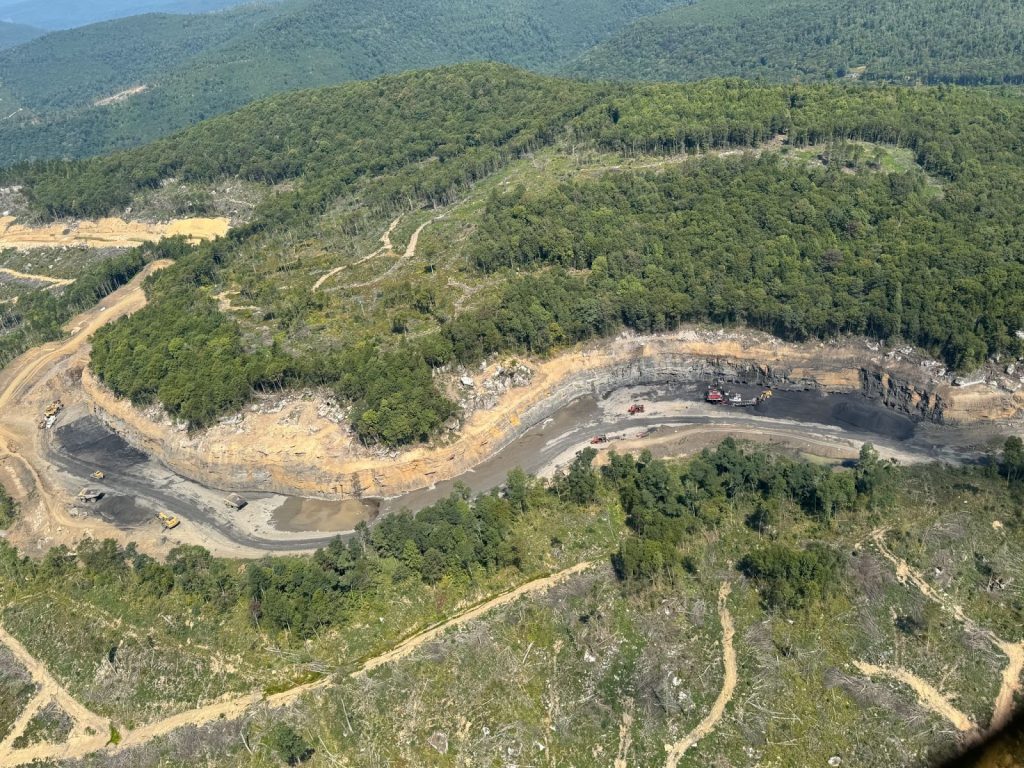Front Porch Blog

There are few corners of West Virginia as beautiful as the Yew Mountains, a section of the Allegheny range in Greenbrier, Nicholas, Pocahontas and Webster counties. The area includes tens of thousands of acres of the Monongahela National Forest, including the Cranberry Glades and Wilderness Area, home to the largest bog ecosystem in the state and a popular hiking and camping spot for visitors from throughout the country. The headwaters of the Cherry, Cranberry and Williams rivers originate in the Yew Mountains, and make their way west before converging to form the Gauley River, a world famous kayaking destination and a lynchpin of West Virginia’s tourism economy.
But in the headwaters of the South Fork of Cherry River, a swath of land along the boundary of the national forest is being razed for coal and timber, jeopardizing downstream waterways, and the human and ecological communities that depend on them. The logging company Weyerhauser owns about 250,000 acres of forestland throughout West Virginia’s Allegheny highlands, including vast acreages along the southeastern slopes of the Yew Mountain range. Here, Weyerhauser clear cuts the forest, destroying some of the southernmost stands of red spruce in North America, and South Fork Coal Company strips the land for coal, releasing sediment and other pollutants into pristine waters that are home to native brook trout and the endangered candy darter.
Since 2022, Appalachian Voices has been working closely with our partners, especially the Allegheny-Blue Ridge Alliance and the West Virginia Highlands Conservancy, to scrutinize and challenge South Fork Coal Company’s operations in the South Fork of Cherry River, a few miles upstream from the community of Richwood. In that time, we have filed lawsuits against the Office of Surface Mining Reclamation and Enforcement and the Fish and Wildlife Service for allowing South Fork Coal to operate without employing legally required protective measures for the candy darter. We’ve also sued the US Forest Service for ignoring its obligations under the Endangered Species Act, National Environmental Policy Act and Administrative Procedure Act when it chose to allow the company to truck coal through the Monongahela National Forest.

In addition to these lawsuits, our partners at the Allegheny-Blue Ridge Alliance and West Virginia Highlands Conservancy have watched these mines closely, and filed numerous regulatory complaints against the company with both state and federal regulators.
The enforcement strategies of the West Virginia DEP have proven wholly ineffective. And it could take months or years to resolve these matters in the courtroom, but for the last few weeks of the Biden administration, there is another pathway to addressing some of South Fork Coal Company’s worst abuses. Sharon Buccino, the acting head of the Office of Surface Mining Reclamation and Enforcement, could take immediate action to shut down South Fork Coal’s illegal coal hauling operation in the Monongahela National Forest.
Under the Surface Mining Control and Reclamation Act, coal mining is prohibited in the national forest, unless a mining company can demonstrate that it had valid existing rights to extract coal within the forest boundary prior to the passage of the law in 1977. Not only did South Fork Coal Company never attempt to prove valid existing rights when it applied for its mining permits, but it even lied to regulators by stating in the permit for Haulroad #2 that it would not enter federal land, even though the road traverses about a mile of the Monongahela National Forest straddling the border of Pocahontas and Greenbrier counties.
When our friends at the West Virginia Highlands Conservancy first brought this matter to her attention over the summer, Buccino, to her credit, had OSMRE begin the formal process of determining whether South Fork Coal Company has the right to operate on federal lands (spoiler alert: It doesn’t).

The creek on the right is 7 miles away, being pummeled with South Fork Coal Company’s mining runoff. Photo by Andrew Young
But now we need Buccino to go one step further while she still has the ability to do so. It is morally and legally indefensible for the OSMRE to allow South Fork Coal Company’s continued flagrant violation of federal law, and desecration of public land, while the agency investigates the company’s claims of valid existing rights. Therefore, Buccino must immediately issue a cessation order against Haulroad #2.
Before working at the OSMRE, Buccino had a long career with the Natural Resources Defense Council, where she was key to successful efforts to designate Bears Ears National Monument in Utah, thus preserving a unique landscape that is sacred to Native peoples. Her previous work affords Buccino a degree of good will and trust among some Appalachian conservation and environmental justice advocates, that, frankly, we do not always feel for the figureheads of federal regulatory agencies.
I am hopeful that in the waning days of the Biden administration, Buccino will recognize this important opportunity to further cement her legacy as an advocate for public lands and pristine places by immediately halting South Fork’s illegal coal-hauling through the Monongahela National Forest. On Dec. 12, 11 conservation organizations, led by the Allegheny-Blue Ridge Alliance, West Virginia Highlands Conservancy and Appalachian Voices sent Buccino a letter asking her to do just this.
As our lawsuits wind their way through the courts, South Fork Coal Company continues to devour the Yew Mountains and dump their crumbs into the Cherry River. But action from Sharon Buccino can right this wrong.
PREVIOUS
NEXT

Leave a comment
Your email address will not be published. Required fields are marked *
One response to “Top mine regulator can and must halt illegal coal hauling in the Monongahela National Forest”
-
Quit poisoning the environment. Protect the forest for the future and today. As you poison the earth, you are poisoning yourself and your family.

Leave a Comment